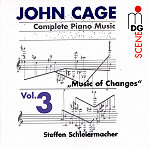Music of Changes was composed in 1951 for the late avant-garde specialist David Tudor. Each sound event of this four part, fifty minute cycle, including durations and dynamics, was determined through chance operations, derived from the sixty four hexagrams of the I Ching, the Book of Changes (hence Cage’s title). Its sound world is similar to the seemingly discontinuous terrain mapped out by Boulez in his 1948 Second Sonata, yet more whimsical and inviting. Schleiermacher plays this music with authority, care, and a feeling for dramatic contrast. He deftly negotiates Cage’s frequent mode switches from conventional playing to plucking the piano’s strings. For all his virtues, though, Schleiermacher does not match Joseph Kubera’s finer tuned virtuosity and more internalized feeling for Cage’s idiom, to say nothing of Lovely Music’s infinitely superior engineering. Those who’ve followed Schleiermacher’s series, to be sure, won’t be dissapointed, but Kubera’s seminal achievement is to John Cage as Glenn Gould was to Bach’s Goldberg Variations.
































